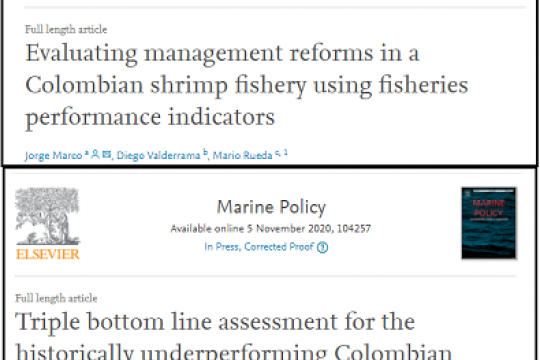EfD Colombia participates in the Marine Program with two investigators: Jorge Marco, (postdoctoral assistant) and Diego Valderrama (senior research fellow). In Colombia, the Marine Program collaborates with Invemar, a marine research institute under the aegis of the Colombian Ministry of Environment, thanks to Mario Rueda, head of the research program in Invemar, to conduct research on sustainable management of coastal marine resources.
In November 2020, Jorge Marco, Diego Valderrama and Mario Rueda published two scientific papers in Marine Policy. The two papers employ the Fisheries Performance Indicators (FPI) methodology, a broadly applicable and flexible tool for assessing performance in individual fisheries regardless of their context (artisanal or industrial, small-scale or large-scale, data-poor or data-rich). To date, more than 100 fisheries around the world have been evaluated following the FPI methodology. Thanks to the Marine Program and EfD Colombia, two emblematic Colombian fisheries has been included in this global FPI dataset of fisheries.
The first article is entitled Triple Bottom Line assessment for the historical underperforming Colombian Queen Conch fishery and examines the environmental, economic and social performance of the Colombian queen conch fishery, an iconic Caribbean fishery historically afflicted with poor outcomes, including a recent major collapse in landings caused by years of unrestrained overfishing.
The second article is entitled Evaluating management reforms in a Colombian shrimp fishery using Fisheries Performance Indicators and compares the performance of the industrial deep-sea shrimp trawl fishery in the Colombian Pacific prior to (year 2012) and following (year 2018) important management reforms (2013-2017 period) aligned with the FAO Code of Conduct for Responsible Fisheries. The FPI methodology was applied to examine changes in fishery performance brought about by the reforms.
